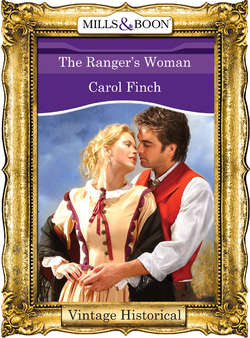Читать книгу The Ranger's Woman - Carol Finch, Carol Finch - Страница 11
Chapter Five
ОглавлениеW hen Quinn reached the site of the robbery he was relieved to note the driver and guard weren’t lying in pools of their own blood. Apparently the two men had decided to hike the shorter distance to the stage station that sat on the east side of the mountains.
Quinn veered off the trodden path to follow the narrow trail that he had seen one group of desperadoes take when they made their getaway. He predicted he would find evidence that the outlaws had joined forces along this route. As anticipated, he noticed a menagerie of hoofprints coming and going along the trail.
“I’m curious about the combination of your style of clothing,” Piper remarked as he led the way up a steep incline. “Any particular reason for it?”
He didn’t bother to glance back at her. No need to torment himself more than necessary. She was too attractive and he wanted to consider her no more than an unwanted companion. Whatever else happened during this assignment, Quinn promised himself that he was not going to be physically or emotionally involved with this woman.
She was an inconvenience that would cause him frustrating delays and that was all she was to him.
“Well?” she prompted when he didn’t respond immediately. “Aren’t you going to speak to me unless you’re spouting orders that I am to obey without question?”
“I told you that I’m not long on chitchat,” he replied. “And yes, there’s a reason for this style of clothing. This is who I am.”
“Just who are you?” she asked interestedly. “I don’t understand what you mean.”
Not many people did, Quinn mused. But then, most folks weren’t interested in getting to know him, just steered clear of him unless they required his fighting skills for protection. But she dared to dig deeper than surface appearances. He should have known this female was inquisitive. That mind of hers seemed to be buzzing constantly.
“I was captured by Kiowas when I was twelve,” he confided. “I had to adapt to their style of dress because I had nothing else to wear.”
Why am I telling her this? he wondered. Maybe because she was one of the few who had ever bothered to ask.
“I’m sorry. That must have been a terrifying experience for a child.”
“It was no picnic, believe me,” he muttered, then tamped down the bitter memories that he had buried beneath layers of ruthless self-discipline. “I hated the Kiowas for killing my father when he tried to protect me. I hated them even more after I tried to escape their camp and they staked me out to a tree for a week to punish me and to make certain I didn’t repeat the attempt.”
Piper grimaced. She couldn’t begin to imagine the emotional turmoil Quinn had undergone as an impressionable child. The fact that the warriors who had taken his father’s life had become his keepers must have left him outraged, defiant and battling inner conflicts. How had he coped with the tragedy?
She thought she knew the answer to that question. He had buried the anger and grief deep inside him. But it was still there. She could hear it in his gritty voice. But she also knew that he was a master at concealing his emotions because she had seen him do it several times during their short acquaintance.
There had been times when his face had gone carefully blank and she had wondered if he felt any emotion at all. But it was there, simmering in places that he refused to reveal to the world.
“How did you escape from the Kiowa camp?” she asked curiously.
“I didn’t. When I was fourteen they traded me to a Comanche shaman who wanted an interpreter while he and the chieftains were conducting powwows with the army. Since I spoke English, Spanish and the dialects of both tribes they needed me as a go-between.”
Piper clamped her legs tightly to the horse’s flanks as they veered through a narrow passage that opened to a sheer drop—exactly like the one she had found herself dangling over a few hours earlier.
When anxiety threatened to swamp her she closed her eyes and concentrated on carrying on her conversation with Quinn. “What were you supposed to interpret for the shaman and Comanche chiefs?” she asked, her voice wobbling noticeably.
“Worthless peace treaties,” Quinn said, and snorted.
“The Comanche broke their promises?”
“No, the government did,” he said. “The army sent a strike force to our winter encampment in the Sierra Diablo Mountains north of here. They practically annihilated the clan I was living with. Those who survived were rounded up and herded like cattle to Indian Territory.”
Piper grimaced. This tale just kept getting worse. She felt ashamed of herself for harboring ill feelings toward her domineering father. They seemed trite and insignificant compared to the tragedy Quinn endured. Her trials and struggle for individuality hadn’t been life-altering nightmares like Quinn’s had been.
